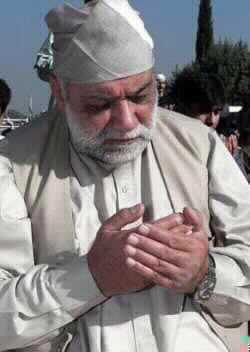ISLAMABAD, Pakistan - Pakistan made a major peace overture to nuclear rival India on Monday, proposing visits between their leaders in an effort to ease decades-long tensions over the disputed Kashmir region.
Pakistan Prime Minister Zafarullah Khan Jamali called Indian Prime Minister Atal Bihari Vajpayee and asked "to resolve outstanding issues through dialogue," according to Pakistan Television.
Jamali also said Pakistan officials are willing to visit India and invited Indian officials to visit Pakistan "in the cause of peace," the report said.
Jamali made his offer after Vajpayee last week proposed talks between the two nations while visiting the troubled Indian-Kashmir capital of Srinagar. It also comes weeks before a top Bush administration official visits the region in an effort to ease ongoing tensions.
According to a Pakistan foreign ministry statement, Jamali "welcomed Prime Minister Vajpayee's offer of talks with Pakistan and reiterated Pakistan's readiness for a dialogue with India at any level."
The South Asian neighbors have fought two of their three wars over Kashmir, which is divided between India and Pakistan but which both claim in its entirety.
So far, India has refused to negotiate with Pakistan, instead demanding that Islamabad first stop Muslim fighters crossing from Pakistan-ruled Kashmir into Indian-ruled Kashmir to launch attacks.
The fighters have been fighting since 1989 for the region's independence or merger with Pakistan, and Pakistan-based fighting groups regularly claim responsibility for shooting and bomb attacks in Kashmir.
When Vajpayee made the proposal last week, he said Pakistan first had to close fighting camps in its territory.
Pakistan says it is doing all it can to seal the border and asked Monday for more international monitors to verify its assertions that no cross-border infiltrations are taking place. India has blocked the request.
Islamabad says it only gives political and moral support to the fighters .
Under increased pressure to clamp down on extremist Muslim groups, Pakistan promised Monday to stop outlawed groups from reorganizing under new names.
Several groups outlawed by President Gen. Pervez Musharraf after the Sept. 11, 2001, attacks in the United States appear to have sidestepped the ban by adopting new names. One of them, the anti-Indian group Lashkar-e-Tayyaba, regrouped under the banner of Jamaat al-Dawat.
Lashkar-e-Tayyaba often has been accused by India of carrying out attacks on Indian troops in its part of Kashmir.
The dispute over Kashmir attracted international attention only after India conducted a 1998 nuclear test and Pakistan followed with its own.
Deputy Secretary of State Richard Armitage will discuss Kashmir province when he visits Pakistan and India next month, Pakistan's Foreign Ministry said Monday. Armitage will visit the region May 5-11 and is expected to visit Afghanistan .
Both countries have declared themselves nuclear powers and there are fears that another conflict could escalate into a nuclear confrontation.
During the telephone conversation, the two leaders also discussed ways of moving beyond the Kashmir dispute. They spoke for 10 minutes, according to the Press Trust of India .
"The prime ministers exchanged views on exploring ways and means to initiate relations in economic, culture and sports fields which will be to the mutual benefits of the two people," the foreign ministry statement said.
PHOTO CAPTION
Pakistani Prime Minister Zafarullah Khan Jamali is seen in this Nov. 22, 2002 file picture offering prayers in Islamabad, Pakistan. Jamali telephoned his Indian counterpart Atal Bihari Vajpayee urging fresh talks and reciprocal visits to solve disputes between nuclear rivals Pakistan and India. (AP Photo/B.K.Bangash, File)
- Author:
AP - Section:
WORLD HEADLINES


 Home
Home Discover Islam
Discover Islam Quran Recitations
Quran Recitations Lectures
Lectures
 Fatwa
Fatwa Articles
Articles Fiqh
Fiqh E-Books
E-Books Boys & Girls
Boys & Girls  Women
Women










